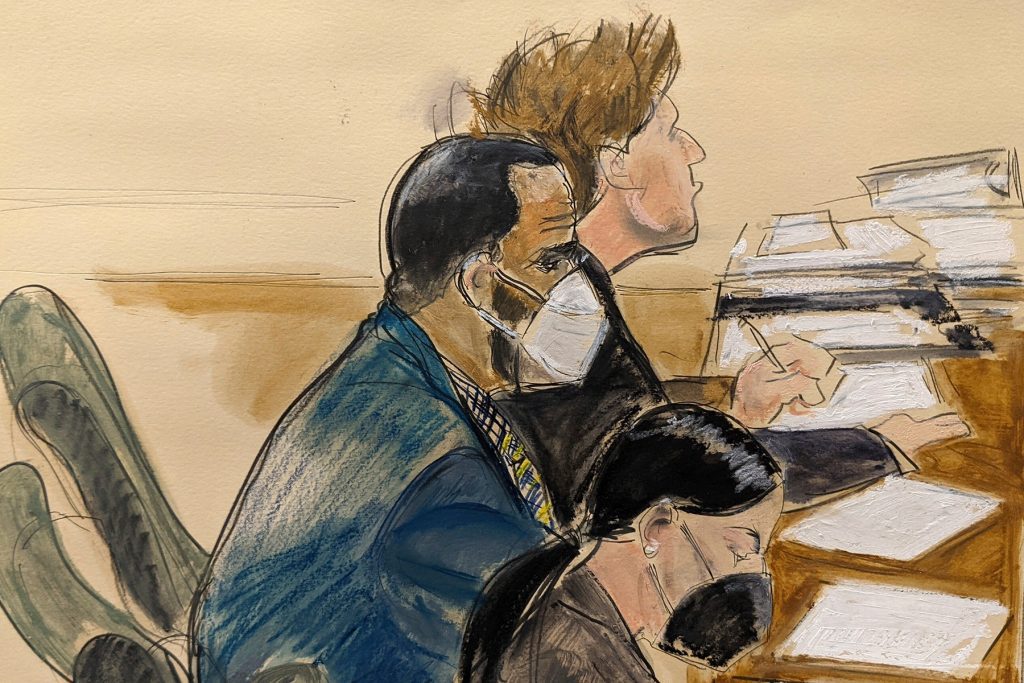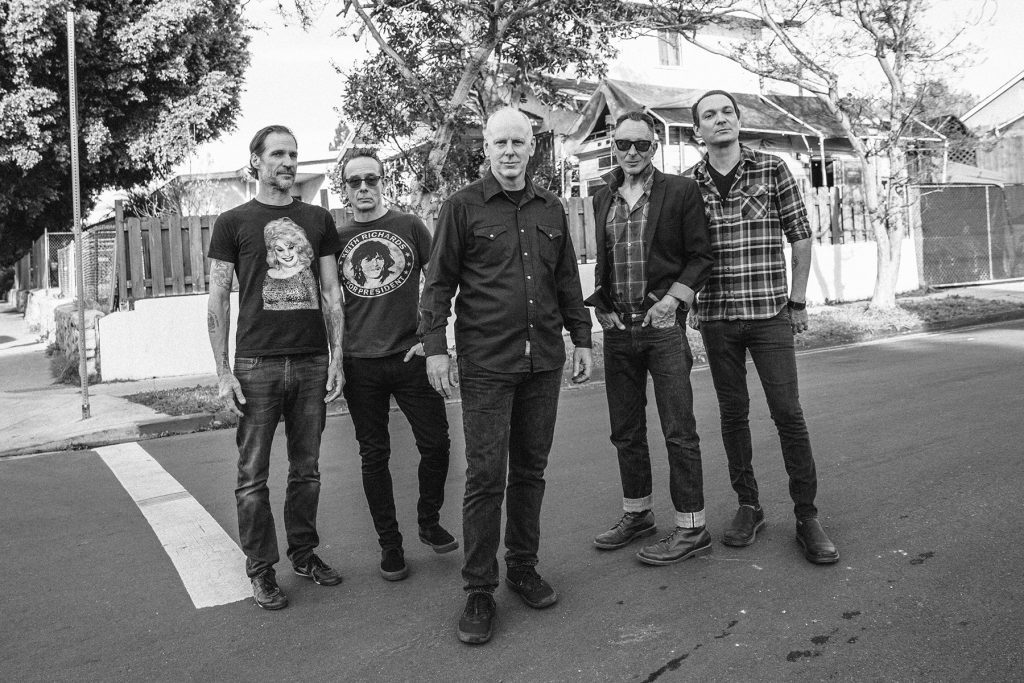
Bruce Dickinson on the Good and Evil That Inspired Iron Maiden’s New Album, ‘Senjutsu’
When the coronavirus shut down the world down last year, two things gave Bruce Dickinson some peace of mind: Iron Maiden had finished recording their upcoming 17th album, Senjutsu, in 2019, and he could quarantine with “somebody I actually like,” his girlfriend. It all went pretty well for a little bit.
“The sun was out for the first part of it, and it was like a novelty at first,” the singer says in his typically upbeat way via a Zoom call. “I was stuck in Paris in my girlfriend’s apartment, and the worst thing was, we have a very small balcony, and there was a guy in the apartment above us who insisted on practicing his saxophone every 5 o’clock in the afternoon doing the world’s worst ‘The Final Countdown.’ It’s like waking up by a shotgun, you know?”
Now that the planet is slowly reopening, Dickinson — who even at 63 is still known for his tireless and athletic performances — is ready to get back to work. He’s been doing solo spoken-word shows, which he had to interrupt in August after testing positive for Covid-19 despite being vaccinated, and Iron Maiden plan on getting the beast back on the road next summer for a European tour. But before then, they’re releasing Senjutsu, which comes out tomorrow. The 82-minute double album, whose title is Japanese for “strategy,” contains 10 typically Maiden-esque songs with lyrics about war, resilience, and determination set against the band’s triple-guitar assault. Dickinson sings each one with the same indefatigable and inspiring spirit he had when he replaced original frontman Paul Di’Anno four decades ago.
blogherads.adq.push(function () {
blogherads
.defineSlot( ‘medrec’, ‘gpt-mob-article-inbody1-uid0’ )
.setTargeting( ‘pos’, [“mid-article”,”mid”,”in-article1″,”mid-article1″] )
.setSubAdUnitPath(“music//article//inbody1”)
.addSize([[300,250],[2,2],[3,3],[300,461],[320,480],[2,4],[4,2]])
;
});
The time off has helped him hear some of Senjustu’s songs differently, but in the case of “The Writing on the Wall,” a lilting heavy rocker that he co-wrote with guitarist Adrian Smith, he says he came to see it differently. “During quarantine over the past year, I caught up on all the TV shows that I never get to watch because I’m always touring,” he says of how he came up with the song’s video. “Whilst binge-watching Sons of Anarchy, I was like, ‘Wouldn’t it be really cool if the Four Horsemen of the Apocalypse were bikers?’ ” With that idea in mind, he linked up with some former Pixar execs who helped him depict the band’s zombie mascot Eddie as the harbinger of End Times, perfectly setting up all the rest of the record’s biblical fury. The singer also spoke to IndieLand about his personal philosophies about good and evil and how he reflects them in Iron Maiden’s music.
There seems to be a lot more going on than Belshazzar’s Feast in the “Writing on the Wall” video. What did you want to say with the clip?
It’s a hybrid of lots of different stories. So when our protagonist — let’s call him Daniel, but he’s also Gandalf or Obi Wan; he’s the hooded guy that’s going to go and stand up for the poor, downtrodden masses — when he goes in there and zaps the party lowlifes, it’s actually the parting of the Red Sea, or the Green Sea in the case of the video.
blogherads.adq.push(function () {
blogherads
.defineSlot( ‘medrec’, ‘gpt-mob-article-inbody2-uid1’ )
.setTargeting( ‘pos’, [“mid-article2″,”mid”,”in-article2″,”mid-article”] )
.setSubAdUnitPath(“music//article//inbody2”)
.addSize([[300,250],[300,251],[2,4],[4,2],[320,480],[3,3]])
.setLazyLoadMultiplier(2)
;
});
Although “Writing on the Wall” was Belshazzar’s Feast, the story before that was the story of Nebuchadnezzar, the king that went mad and thought he was turning into a beast and went out and started eating grass. And that’s where we got the idea of turning this guy into a goat and slamming it up against the wall, because you’ve got the nemesis of the Four Horsemen coming along to make sure that justice is done to the bad guys and the elites and all of their minions.
Two songs on Senjutsu — “Days of Future Past,” which you co-wrote, and “Senjutsu” — have lyrics about Judgment Day. What’s your vision of the apocalypse?
I don’t really think the apocalypse, per se, exists, but it’s something that makes some people feel comfortable because they feel uncomfortable with confronting reality.
If you can’t cope with the complexities of reality, you go to apocalyptic prophecies, then you choose to believe them, and then you have your tribe. You can see it at the moment the whole anti-vax thing and the propaganda that’s going on. So people have an urge to believe, and I don’t think you need to read the Bible because actually there were plenty of apocalyptic prophecies kicking around, not even in the Bible. We’ve invented our own on a regular basis. I mean, the world was going to end with the Y2K bug in 2000. Then there was going to be an asteroid. There’s a million and one ways that the world is going to end. But oh, dear, it hasn’t.
Interestingly, I’m doing a podcast at the moment with an Oxford University psychology professor, Kevin Dutton, who is an expert on psychopaths amongst other things, and one of our guests was a Bible scholar, an eschatologist who was also an expert in apocalyptic prophecies and end times. So we had a very interesting conversation about groups that regularly sit on top of a mountain and go, “The world’s going to end,” and it doesn’t. And then they go back the following year and say, “Well, we made a mistake. We just miscalculated here. But it’s definitely going to end.”
The thing about the apocalypse is, it’s great stuff for writing songs about because it’s dramatic; it’s black and white. It’s got the devil and God and good and bad and evil. I always try and fudge it a little bit if I’m writing a song.
How does that tie into what you wrote on “Days of Future Past”?
It’s actually kind of based on the movie Constantine, which in turn was based on the graphic novel. All I did was write about the Keanu Reeves character who is doomed to walk the Earth until he gets his shit together after which he’s approved by God, who is the ultimate manipulative narcissist, you know? Look at the Book of Job, right? Manipulative narcissism. “I’m going to really fuck with your life and then I want to love you.” So, good question: “Is God a psychopath?” We’ll leave that one to the podcast. So I just tried to take a slightly different take on it in which, instead of being compliant with God’s requests, he’s really pissed off. He’s like, “What gives you the right to inflict this shit on me?”
blogherads.adq.push(function () {
blogherads
.defineSlot( ‘medrec’, ‘gpt-mob-article-inbodyX-uid2’ )
.setTargeting( ‘pos’, [“mid”,”mid-articleX”,”in-articleX”,”mid-article”] )
.setSubAdUnitPath(“music//article//inbodyX”)
.addSize([[300,250],[300,251],[3,3]])
.setLazyLoadMultiplier(2)
;
});
I don’t suppose anybody noticed, but I did a similar thing on “Flight of Icarus” [from 1983’s Piece of Mind]. The original Icarus story is, “Do what your dad says, otherwise bad shit will happen to you.” And I flipped it on its head, and I made the father the villain. I said, “If you could give an adolescent wings and they would fly, what do you think they would do?”
You seem to have spent a lot of time thinking about theology lately. How do you describe your personal code?
I really don’t have one except trying to be a generally decent human being. But I detest extremism in all of its forms, because it’s people just shutting off their minds to ideas just because other people might be different, or they don’t belong to the same group. But at the same time, I describe myself as a soft libertarian in that I believe in most of the libertarian things; I think government should generally leave people alone because governments are pretty rubbish at most things and people are generally better at dealing with themselves. But at the same time, if people aren’t going to be nice to each other because they’re bigoted or whatever, you’ve got to step in and be firm. But in terms of religious beliefs, none of the above, really. I don’t go to church, and I don’t pray.
What is the Senjutsu song “Darkest Hour” about?
It’s about Churchill and how, for all his mistakes and his personal flaws — and there were plenty of them — he did one thing in his life, which was to stand up against this tyrant who would have engulfed the world in his madness … you know, Hitler. And Churchill stood up against the advice of lots of great, worthy people. Half his government was opposed to him, and he was just a cantankerous alcoholic, grumpy old git that went, “No. Had enough. You shall not pass. That’s it.”
But of course, he had his flaws, and that’s the point of the chorus: There he is, “naked by the throne of kings.” He suffered from depression, which is the line about the black dog stalking him, and the song is bookended by beach sounds at both ends. The beach at the beginning is Dunkirk, where basically we ran away and the beach at the end is D-Day. And both beaches were steeped in blood for different reasons.
September marks 40 years since your first audition for Iron Maiden …
I’ll take your word for it that it was my first.
blogherads.adq.push(function () {
blogherads
.defineSlot( ‘medrec’, ‘gpt-mob-article-inbodyX-uid3’ )
.setTargeting( ‘pos’, [“mid”,”mid-articleX”,”in-articleX”,”mid-article”] )
.setSubAdUnitPath(“music//article//inbodyX”)
.addSize([[300,250],[300,251],[3,3]])
.setLazyLoadMultiplier(2)
;
});
Well, according to the internet …
“According to the internet.” Well, there you go. I looked at my net worth the other day and I was like, “Holy shit, I’m worth four times what Steve Harris is worth. I must have written a whole bunch of songs I never knew about.” So no, a lot of it’s bullshit. But they are OK on dates sometimes. So yeah, it is probably around 40 years.
What do you remember about that audition?
I did two auditions actually. The first one was just in a rehearsal room. They asked me to learn four songs and I thought, “Well, they’ve only got two albums. I’ll learn them all.” So we bashed through a load of them, and then we started bashing through old Thin Lizzy and Deep Purple covers because we knew them all. And then they had to go off and do some gigs with the old singer, Paul [Di’Anno], in Sweden. So I thought, “Well, that must be kind of difficult because they just had this kind of very fun day with me.” And then they came back and said, “OK, well, we fired him and so now we want to give you a test in a recording studio just to make sure we’re not hearing things.” So I went and there was the late, great [producer] Martin Birch. And I sang over four backing tracks that they recorded live in Japan. And it was Siskel and Ebert, two thumbs up, and I was in that night. So we all went down to a UFO concert, I think, at a theater somewhere and drank a lot of beer. And then the rest is history. The hard work actually began the next day.
And here you are now.
Yeah, still alive.




